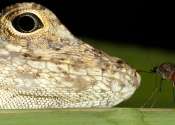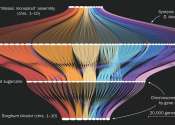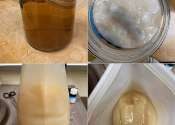The flavors of fire: How does heat make food taste good?
Sure, cooking our food can make it safer to eat and more digestible. But let's be honest. We mainly cook to create something we enjoy—something delicious.

Sure, cooking our food can make it safer to eat and more digestible. But let's be honest. We mainly cook to create something we enjoy—something delicious.
Biochemistry
Apr 8, 2024
0
8

A blood-sucking nuisance, mosquitoes are responsible for spreading diseases to hundreds of millions of people every year. True?
Plants & Animals
Mar 27, 2024
0
1

Modern hybrid sugarcane is one of the most harvested crops on the planet, used to make products including sugar, molasses, bioethanol, and bio-based materials. It also has one of the most complex genetic blueprints.
Molecular & Computational biology
Mar 27, 2024
0
173

Welcome to New Jersey, known around the world for Tony Soprano, Turnpike tolls, chemical plants, and ... maple syrup?
Agriculture
Mar 25, 2024
0
5

During cold and flu season, excess mucus is a common, unpleasant symptom of illness, but the slippery substance is essential to human health. To better understand its many roles, researchers synthesized the major component ...
Biochemistry
Mar 18, 2024
0
67

Kombucha is a fermented tea known for its health benefits and tangy kick. But brewers can find it challenging to keep kombucha's alcohol levels low because the bacteria and yeast used in the fermentation process vary from ...
Biochemistry
Mar 17, 2024
0
6

In the evolving landscape of plant growth modeling, there is a distinguished presence of mechanistic models aimed at capturing the intricate dynamics of plant development through parameter estimation from experimental data. ...
Plants & Animals
Mar 11, 2024
0
1

For the first time, scientists from the University of Cologne (UoC) have developed artificial nucleotides, the building blocks of DNA, with several additional properties in the laboratory, which could be used as artificial ...
Biotechnology
Mar 8, 2024
0
89

Barbara Intermill's horses don't adjust well to the water when she takes them away from home. So she's experimented with some advice from seasoned horse travelers. Common guidance is to add something that will make the strange ...
Plants & Animals
Mar 8, 2024
0
1

Proteins not only carry out the functions that are critical for the survival of cells, but also influence the development and progression of diseases. To understand their role in health and disease, researchers study the ...
Molecular & Computational biology
Mar 1, 2024
0
65
Sugar (see below for etymology) is a class of edible crystalline substances, mainly sucrose, lactose, and fructose. Human taste buds interpret its flavor as sweet. Sugar as a basic food carbohydrate primarily comes from sugar cane and from sugar beet, but also appears in fruit, honey, sorghum, sugar maple (in maple syrup), and in many other sources. It forms the main ingredient in candy. Excessive consumption of sugar has been associated with increased incidences of type 2 diabetes, obesity and tooth decay.
This text uses material from Wikipedia, licensed under CC BY-SA